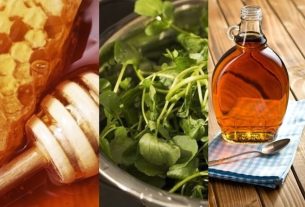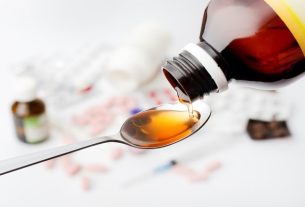Some home remedies for dry coughs, such as ginger and lemon tea, mint tea or thyme tea, have calming and anti-inflammatory properties, which reduce irritation in the throat, helping to calm the cough naturally.
A dry cough can be caused by respiratory allergies, asthma, bronchitis, infections such as the flu, cold, sinusitis, COVID-19 or whooping cough, or even gastroesophageal reflux, for example. See other causes of a dry cough that doesn’t go away.
If the dry cough persists for more than 2 weeks, it is advisable to consult a pulmonologist or otorhinolaryngologist, as this symptom may be related to an allergy or other lung disease. This way, the doctor can identify the cause of the dry cough and recommend the most appropriate treatment.
Some home remedy options for dry cough are:
1. Mint tea
Mint has antiseptic, mild tranquilizing and analgesic properties, especially locally and on the mucous membranes of the digestive system.
Ingredients
- 1 teaspoon of dried or fresh mint leaves;
- 1 cup of water;
- 1 teaspoon of honey.
Preparation mode
Boil the water and then add the chopped mint leaves to the cup, then let it rest for 5 minutes. Strain and drink afterwards, sweetened with honey. See other benefits of mint.
2. Alteia tea
Alteia has anti-inflammatory and sedative properties that can help calm dry coughs. See other benefits of alteia.
Ingredients
- 1 tablespoon of marshmallow root;
- 1 cup of water.
Preparation mode
Add the marshmallow root to the cup of boiling water and let it rest for 10 minutes. Strain and drink warm, up to 2 cups per day.
Alteia tea should not be used by children, pregnant or breastfeeding women. Furthermore, people with diabetes should only consume this tea with medical advice, as it can increase the effect of antidiabetic medications and cause changes in blood glucose levels.
4. Pansy tea
Another good home remedy for dry cough is to drink pansy tea because this medicinal plant has calming properties that help calm the cough and also strengthen the immune system.
Ingredients
- 1 tablespoon of pansy;
- 1 cup of boiling water;
Preparation mode
Add the pansy leaves to the boiling water and let it rest for 5 minutes. Strain and drink warm tea sweetened with honey.
4. Ginger tea with lemon
Ginger tea with lemon has anti-inflammatory properties, helping to reduce irritation in the throat and lungs, as well as decongest the airways and relieve dry coughs.
This tea can also be used as a home remedy for coughs in children, as it has no side effects.
Ingredients
- 1 cm of ginger root or ½ teaspoon of powdered ginger;
- Juice of 2 lemons;
- 1 teaspoon of honey;
- ½ liter of water.
Preparation mode
Boil the ginger and water over low heat until the mixture is reduced to half its initial volume and then turn off the heat. Strain and add lemon juice.
To sweeten, 1 teaspoon of honey can be added, which also helps to moisturize the throat, relieving an irritating dry cough.
You can take 1 tablespoon of this tea every 4 hours, while the cough persists.
Ginger should not be consumed by people using anticoagulants, and therefore should be removed from the tea in these cases. Furthermore, honey should not be used in case of babies under 2 years of age. Find out more options on how to get rid of a dry cough.
5. Mallow tea
Mallow tea has anti-inflammatory and calming effects on the bronchi and can be used to relieve dry coughs caused by bronchitis.
Ingredients
- 1 teaspoon of dried mallow flowers or leaves;
- 1 cup of water.
Preparation mode
Boil the water, turn off the heat, add the mallow and let it rest for 10 minutes. Strain and drink warm up to 3 times a day or as directed by your doctor or herbalist.
6. Licorice tea
Licorice tea has glycyrrhizin in its composition, which is a substance with anti-inflammatory and soothing action on the throat, which helps to relieve dry coughs.
Ingredients
- 1 teaspoon of licorice root;
- 1 cup of boiling water;
- Honey to sweeten to taste.
Preparation mode
Add the licorice to the cup of boiling water, cover and let it rest for 10 minutes. Strain and sweeten with honey if desired. Drink this tea up to 2 times a day.
Licorice tea should not be consumed by pregnant or breastfeeding women and by people with heart problems.
7. Thyme tea
Thyme tea is rich in thymol, carvacrol and γ-terpinene, with anti-inflammatory and expectorant action, as well as helping to relax the throat muscles, relieving dry coughs.
Ingredients
- 1 teaspoon of dried or dehydrated thyme;
- 1 cup (tea) of water.
Preparation mode
Boil the water and then turn off the heat and add the thyme leaves. Cover, let rest for 10 minutes, strain and then drink warm, up to 3 cups a day.
Thyme tea should not be used by children under 12 years of age, pregnant or breastfeeding women, or by people who have a history of estrogen-dependent diseases, such as breast or ovarian cancer or endometriosis, for example.
Bibliography
- MOURA, M. F. Secrets and virtues of healing plants. 1.ed. Lisbon: Seleções, 2011. 39; 130.
- MINISTRY OF HEALTH. Monograph of the species Mentha x piperita L. (Peppermint). 2015. Available at: <https://portalarquivos2.saude.gov.br/images/pdf/2017/setembro/11/Monografia-Mentha-piperita.pdf>. Accessed on January 15, 2020
- TOIU, Anca et al. Pharmacognostic research on Viola tricolor L. (Violaceae). PHARMACY. Vol.57, n.2. 218-222, 2009
- SUTOVSKA, M. et al. Antitussive activity of Althaea officinalis L. polysaccharide rhamnogalacturonan and its changes in guinea pigs with ovalbumine-induced airways inflammation. Bratisl Lek Listy. Vol.112, n.12. 670-675, 2011
- BRAZILIAN JOURNAL OF FUNCTIONAL NUTRITION. A review on the beneficial effects of phytochemicals present in edible flowers. Available at: <https://www.vponline.com.br/portal/noticia/pdf/ccaab5e08561db9f846d744c9728c889.pdf>. Accessed on January 15, 2020

Sign up for our newsletter and stay up to date with exclusive news
that can transform your routine!
Warning: Undefined array key "title" in /home/storelat/public_html/wp-content/plugins/link-whisper-premium/templates/frontend/related-posts.php on line 12
Warning: Undefined array key "title_tag" in /home/storelat/public_html/wp-content/plugins/link-whisper-premium/templates/frontend/related-posts.php on line 13




